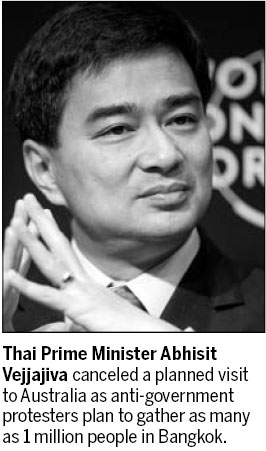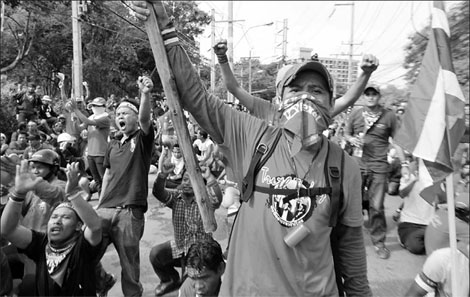Thailand keeps interest rate unchanged ahead of protests
|
The Thai government fears more protests like this one last April. Udo Weitz / Bloomberg News |
Climbing baht is evidence Asia is spearheading recovery from downturn
BANGKOK - Thailand kept its benchmark interest rate unchanged for a seventh meeting, refraining from following neighbor Malaysia in raising borrowing costs as political protests threaten the nation's economic recovery.
The Bank of Thailand left the one-day bond repurchase rate at 1.25 percent, the lowest level since July 2004, it said in Bangkok on Wednesday. The decision was predicted by all 20 economists surveyed by Bloomberg News.
The government plans to invoke the Internal Security Act to control anti-government protests this weekend, amid concerns political unrest will hurt an economy that emerged from a recession last quarter. The central bank said it will likely raise interest rates in the coming months if the recovery is sustained, as the need for accommodative monetary policy eases.
"Given the lingering political uncertainties and also ahead of the protest, I suppose the central bank wants to see the extent of the impact socially and economically," Julia Goh, an economist at CIMB Investment Bank Bhd. in Kuala Lumpur, said before the decision. "The demand pressure is still moderate. There is no urgency to raise the interest rate at this point."
Thailand's $261 billion economy, Southeast Asia's largest after Indonesia, expanded 5.8 percent in the three months ended December from a year earlier after contracting for four consecutive quarters. Exports surged 31.4 percent in January and companies including Hana Microelectronics Pcl and Thai Union Frozen Products Pcl have forecast higher sales this year.
Financial 'imbalances'

"If there is nothing that will create serious damage to the economy and the global economy goes in line with our forecast, there is a high possibility that we will adjust the rate to a more normal level in the period ahead," Bank of Thailand Assistant Governor Paiboon Kittisrikangwan said in Bangkok on Wednesday. The next policy meeting is on April 21.
Malaysia's central bank raised its benchmark interest rate to 2.25 percent last week, saying it wants to avoid "financial imbalances" after the nation climbed out of a recession in the fourth quarter. Australia and Vietnam have also increased borrowing costs in recent months, while China and India have asked lenders to set aside more reserves to drain excess cash from their economies to avert asset bubbles and fight inflation.
Political impact
Still, Philippine and South Korean policy makers are forecast by economists surveyed by Bloomberg News to keep their benchmark rates unchanged this week.
Thailand's inflation isn't yet a concern and pressure to adjust the policy rate "remains low", Bank of Thailand Deputy Governor Bandid Nijathaworn said March 2. Consumer prices rose 3.7 percent from a year earlier last month after climbing 4.1 percent in January.
The government predicted last month the economy may grow as much as 4.5 percent this year after contracting 2.3 percent in 2009. The forecast didn't take into account any further street protests or violence, and Finance Minister Korn Chatikavanij said Feb 22 any political unrest that hurts investor confidence may disrupt the recovery.
Monetary policy
"The lower downside risk to growth has significantly lessened the need for an exceptionally accommodative monetary policy, but we think it will be more prudent to hold the rate now and wait to see the impact of political uncertainties," Paiboon said on Wednesday.
Prime Minister Abhisit Vejjajiva canceled a planned trip to Australia at the end of this week, when anti-government protesters plan to gather as many as 1 million people in Bangkok.
The government will impose the Internal Security Act from March 11 to 23 in and around Bangkok, Supachai Chaisamut, a deputy government spokesman, said on Wednesday.
Military coup
Since the military ousted former Prime Minister Thaksin Shinawatra in a 2006 coup, demonstrations by his supporters and opponents have led to airport blockades, rioting and bombings.
Four branches of Bangkok Bank Pcl, Thailand's largest lender, were targeted with grenades on Feb 27, the day after a court seized $1.4 billion of Thaksin's fortune.
The Thai baht was little changed at 32.69 a dollar as of 3:29 pm yesterday in Bangkok. The currency has climbed 1.8 percent this year as evidence Asia is spearheading the recovery from a global recession attracts funds to the region's assets.
BLOOMBERG NEWS
(China Daily 03/11/2010 page14)









